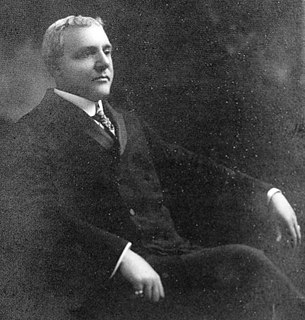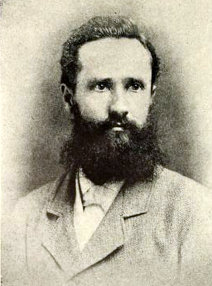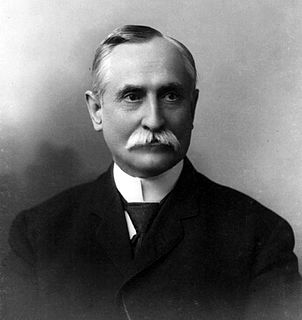
Science and Health with Key to the Scriptures is, along with the Bible, the central text of the Christian Science religion. Mary Baker Eddy described it as her "most important work." She began writing it in February 1872 and the first edition was published in 1875. However, she would continue working on it and making changes for the rest of her life.

Mary Baker Eddy was an American religious leader and author who founded The Church of Christ, Scientist, in New England in 1879. She also founded The Christian Science Monitor, a Pulitzer Prize-winning secular newspaper, in 1908, and three religious magazines: the Christian Science Sentinel, The Christian Science Journal, and The Herald of Christian Science. She wrote numerous books and articles, the most notable of which was Science and Health with Key to the Scriptures, which had sold over nine million copies as of 2001.

Christian Science is a set of beliefs and practices associated with members of the Church of Christ, Scientist. Adherents are commonly known as Christian Scientists or students of Christian Science, and the church is sometimes informally known as the Christian Science church. It was founded in 19th-century New England by Mary Baker Eddy, who wrote the 1875 book Science and Health with Key to the Scriptures, which outlined the theology of Christian Science. The book became Christian Science's central text, along with the Bible, and by 2001 had sold over nine million copies.

The Destiny of The Mother Church is a book by Bliss Knapp published by Christian Science Publishing Society in 1991. Knapp and his parents, Ira O. and Flavia Stickney Knapp, all knew Mary Baker Eddy. His parents were students of hers and his father was one of the original members of the Board of Directors of The Mother Church. Until 1991, the book was repeatedly rejected for publication by the Christian Science Board of Directors because of the depiction of Eddy as the fulfillment of biblical prophecy and equating her with Christ Jesus, a position which Eddy considered blasphemous. Eddy identified the woman in the Book of Revelation not as a person, but as "generic man". Destiny's publication caused divisions within the church, including several resignations of prominent church employees. Critics claimed that the failure of the church's then-recent television venture, which had cost the church several hundred million dollars, had motivated the Board's reversal on publishing Knapp's book. Knapp, his wife and her sister left wills that granted bequests totalling over $100 million promised to the church if the book were to be published. The wills set a time limit of 20 years for the book to be published, otherwise the bequests were to be divided between Stanford University and the Los Angeles County Museum of Art, and the church would receive nothing. The 1973 death of Knapp's wife set the date of the time limit to May 1993.
Robert Arthur Peel was a Christian Science historian and writer on religious and ecumenical topics. A Christian Scientist for over 70 years, Peel wrote editorials for the Christian Science Monitor, a publication owned by the Church of Christ, Scientist. He was also a counsellor for the church's Committee on Publication, set up by Mary Baker Eddy (1821–1910), the religion's founder, to protect her own and the church's reputation.

Emma Curtis Hopkins was an American spiritual teacher and leader. She was involved in organizing the New Thought movement and was a primary theologian, teacher, writer, feminist, mystic, and healer, who ordained hundreds of people, including women, at what she named the Christian Science Theological Seminary of Chicago. Emma Curtis Hopkins was called the "teacher of teachers" because a number of her students went on to found their own churches or to become prominent in the New Thought Movement.
Christian Science is a 1907 book by the American writer Mark Twain (1835–1910). The book is a collection of essays Twain wrote about Christian Science, beginning with an article that was published in Cosmopolitan in 1899. Although Twain was interested in mental healing and the ideas behind Christian Science, he was hostile towards its founder, Mary Baker Eddy (1821–1910).
Virginia S. Harris is a teacher and practitioner of The First Church of Christ, Scientist. She previously served as Publisher of The Writings of Mary Baker Eddy, President and founding Trustee of The Mary Baker Eddy Library, and member and Chairman of The Christian Science Board of Directors between 1990 and 2004.
Philip Zaleski is the author and editor of several books on religion and spirituality, including The Recollected Heart,The Benedictines of Petersham, and Gifts of the Spirit. In addition, he is coauthor with his wife Carol Zaleski of The Book of Heaven, Prayer: A History, and The Fellowship: The Literary Lives of The Inklings J. R. R. Tolkien, C. S. Lewis, Owen Barfield, Charles Williams.

Eschatology is a New Thought movement founded by American writer and former practitioner William W. Walter. Walter was formally a member of the Catholic Church and then The First Church of Christ, Scientist until 1912 when he rejected organized religion in order to found his own metaphysical system. Although it is generally classified as a new religious movement, Walter did not see it as a religious movement, and his followers reject the association with religion. He originally named his organization "The Walter Method of Christian Science"; and the term Eschatology as a trademark for Walter's teaching was not used until the 1920s.

Augusta Emma Stetson was an American religious leader. Known for her impressive oratory skills and magnetic personality, she attracted a large following in New York City. However, her increasingly radical theories, conflicts with other church members including a well-known rivalry with Laura Lathrop, and attempts to supplant Mary Baker Eddy as the leader of The First Church of Christ, Scientist, led to her eventually being excommunicated from the church on charges of insubordination and of false teaching. Afterwards she began preaching and publishing various works on her theories which she named the "Church Triumphant," and started a controversial radio station to advance her cause.

The Salem witchcraft trial of 1878, also known as the Ipswich witchcraft trial and the second Salem witch trial, was an American civil case held in May 1878 in Salem, Massachusetts, in which Lucretia L. S. Brown, an adherent of the Christian Science religion, accused fellow Christian Scientist Daniel H. Spofford of attempting to harm her through his "mesmeric" mental powers. By 1918, it was considered the last witchcraft trial held in the United States. The case garnered significant attention for its startling claims and the fact that it took place in Salem, the scene of the 1692 Salem witch trials. The judge dismissed the case.

Caroline Fraser is an American writer. She won the 2018 Pulitzer Prize for Biography or Autobiography, and the 2017 National Book Critics Circle Award in Biography, for Prairie Fires: The American Dreams of Laura Ingalls Wilder, a biography of American author Laura Ingalls Wilder.

The Life of Mary Baker G. Eddy and the History of Christian Science (1909) is a highly critical account of the life of Mary Baker Eddy, the founder of Christian Science, and the early history of the Christian Science church in 19th-century New England. It was published as a book in November 1909 in New York by Doubleday, Page & Company. The original byline was that of a journalist, Georgine Milmine, but a 1993 printing of the book declared that novelist Willa Cather was the principal author; however, this assessment has been questioned by more recent scholarship which again identifies Milmine as the primary author, although Cather and others did significant editing. Cather herself usually wrote that she did nothing more than standard copy-editing, but sometimes that she was the primary author.

Calvin Augustine Frye was the personal assistant of Mary Baker Eddy (1821–1910), the founder of Christian Science.
Stephen Gottschalk was an historian of the Christian Science church, the Church of Christ, Scientist. A lifelong Christian Scientist, Gottschalk worked from 1978 until 1990 for the church's Committee on Publication in Boston, an organization set up by Mary Baker Eddy (1821–1910), the founder of Christian Science, to protect her own and the church's reputation. He left the committee in 1990 after disagreeing with the church's handling of internal criticism.

John Valentine Dittemore was director of The First Church of Christ, Scientist, the Christian Science church, in Boston from 1909 until 1919. Before that he was head of the church's Committee on Publication in New York, and a trustee for ten years of the estate of Mary Baker Eddy (1821–1910), the founder of the church. Dittemore is best known as the co-author, with Ernest Sutherland Bates, of Mary Baker Eddy: The Truth and the Tradition (1932).
Numerous new religious movements have developed during the history of the United States. Prior to the American Civil War, new movements included Mormonism, led by a prophet; Adventism, which used biblical scholarship to predict the Second Coming of Jesus; New Thought, which promised that mental powers could provide health and success; and Spiritualism, which offered communication with ghosts or spirits. By 1900, flourishing movements included the Jehovah's Witnesses, a group that emerged from Bible tract publishing; Theosophy, whose leader claimed to be in telepathic communication with Masters of the Ancient Wisdom; Christian Science, which promised spiritual healing; and Black Hebrew Israelites, built on a revelation that African Americans are descendants of the Biblical Hebrews. The 20th century saw the rise of black nationalism groups like Moorish Science and Nation of Islam; anti-Christian groups like Thelema, a magic-based movement involving sex rituals and worship of the Whore of Babalon; Scientology, a Thelema-inspired movement whose founder reportedly identified himself with the Antichrist; and Satanism, a movement that encompasses both theistic worshipers of Christian villains and individualists atheists who re-appropriate Christian imagery. The 20th century also saw the rise of the explicitly-atheistic Objectivism movement.

The Christian Science movement is a religious movement within Christianity founded by Mary Baker Eddy that arose in the mid to late 19th century and that led to the founding of The First Church of Christ, Scientist.

The "Next Friends" suit of 1907 was a lawsuit instigated by the New York World regarding Mary Baker Eddy, a religious leader from New England.














